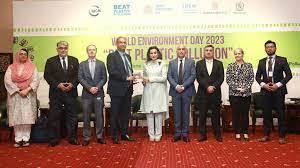Youth, public resistance to plastics ‘only solution’ to phaseout single-use polythene products: Sherry Rehman

Abida Shaheen
Islamabad: Federal Minister for Climate Change and Environmental Coordination, Senator Sherry Rehman on Monday said the youth and public at large had a key role in showing resistance and pressure towards plastics manufacturers to phaseout single-use polythene products like bags and bottles causing serious pollution and environmental degradation in the country.
Addressing a seminar on World Environment Day titled ‘Beat Plastic Pollution’ organised by the International Union for Conservation of Nature-Pakistan (IUCN), Ministry of Climate Change and Environmental Coordination and Serena Hotels, the Minister emphasised the need of motivating the general public to step forward and take the lead in fighting plastic pollution which was insurmountable without mass support and acceptance.
Senator Rehman said the impacts of single-use plastics degrading the environment were conspicuous and glaring. She added that the threshold where once the level of degradation, toxicity and overheating was done due to plastic pollution could reach a level, if left unabated, where it would not be reversible.

“The plastics are damaging the environment and what we have done in the past 80 years is unprecedented in the millennial,” she noted.
The minister appreciated the Serena hotels for switching to glass bottles and shunning the use of plastic pet water bottles. “We are also beginning a journey of letting off easy-to-use and throw-away plastics in the Prime Minister’s house, federal ministries and public departments as efforts are underway,” she informed.
The senator mentioned that there was very little data available on recycling of plastics as the country was not recycling over 70% of its plastic waste. “Plastics do not degrade and it’s a complete canard that it vanishes from the environment after some time. It takes more time than our entire life to degrade. Plastics could be banned in three years but cannot be removed completely,” she said.
Senator Rehman informed that the country produced some 3.3 million metric tonnes of plastics that would go beyond 12 million metric tonnes by 2040. “People would have to stop using plastics. MoCCC is intervening in the market and meeting producers and manufacturers to begin the journey of switching to biodegradable alternatives,” she said.
The senator noted that River Indus was the lifeline of the country that had become the world’s second most polluted river proliferating with plastics.
“You cannot police plastic usage out of each other’s lives. We can make regulations and ban plastics but it will go useless if people are not opting for it. We cannot take out plastics from our culture, life and other matters, but people’s passive use of it could achieve that target,” she reiterated.
The minister underlined that the public needed low-cost solutions to plastics, whereas enough consumer and government pressure on manufacturers and retailers who would face resistance against bad plastics could help achieve the ambition of a “plastic-free Pakistan”.
She emphasised that the nation as citizens, manufacturers, governments, and students who were important in activism would turn the page as it all had to start at their workplace and home to shun plastic use.
Country Director, IUCN-Pakistan, Mahmood Akhtar Cheema presented a souvenir to the minister at the end and lauded her for her candid remarks on the topic of mobilising youth for climate action.
The seminar was attended by members of the diplomatic corps who explained the issues pertaining to plastic pollution and its solutions.





